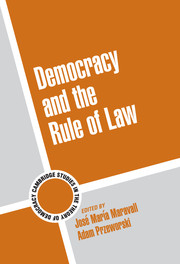Book contents
- Frontmatter
- Contents
- List of Contributors
- Acknowledgments
- Introduction
- Part I
- Part II
- Part III
- 9 Courts as an Instrument of Horizontal Accountability: The Case of Latin Europe
- 10 Rule of Democracy and Rule of Law
- 11 The Rule of Law as a Political Weapon
- 12 The Rule of Law and the Problem of Legal Reform in Michel de Montaigne's Essais
- Author Index
- Subject Index
10 - Rule of Democracy and Rule of Law
Published online by Cambridge University Press: 09 November 2009
- Frontmatter
- Contents
- List of Contributors
- Acknowledgments
- Introduction
- Part I
- Part II
- Part III
- 9 Courts as an Instrument of Horizontal Accountability: The Case of Latin Europe
- 10 Rule of Democracy and Rule of Law
- 11 The Rule of Law as a Political Weapon
- 12 The Rule of Law and the Problem of Legal Reform in Michel de Montaigne's Essais
- Author Index
- Subject Index
Summary
Rule of law and democracy are both desirable attributes of a political system. Scholars writing of democratic transitions from authoritarian rule usually argue that the goal of such a transition is the establishment of democracy with the rule of law, implying that both may be achieved simultaneously. Perhaps that is so. What is often meant by rule of law is no more than the notion that government should work its will through general legislation, legislation to which the governors themselves are subject, rather than through irregular decrees and ad hominem proclamations. But rule of law may require more than this: it may require that people are able to foresee accurately the legal consequences of their actions and not be subject to sudden surprises whether or not these take the form of legistation, or perhaps that the law contain, or at least not violate, certain substantive principles and rights.
Democratic rule minimally requires government by the people or their representatives, elected on a broad franchise. But, in some conceptions, it too many require more than that. Perhaps, democracy demands that the range of choice open to government be broad and not constricted by externally imposed restraints (such as legal protections for minorities). We expect, for example, or hope, that our government can correct inequities arising from markets or social interactions. Such interventions can involve confiscatory taxes or draconian regulations, either of which can threaten claims for minority rights. Or perhaps, democracy requires that the people be regularly and genuinely consulted on fundamental legal changes so that institutions or practices of deliberation and consultation are in place and functioning.
- Type
- Chapter
- Information
- Democracy and the Rule of Law , pp. 242 - 260Publisher: Cambridge University PressPrint publication year: 2003
- 18
- Cited by

